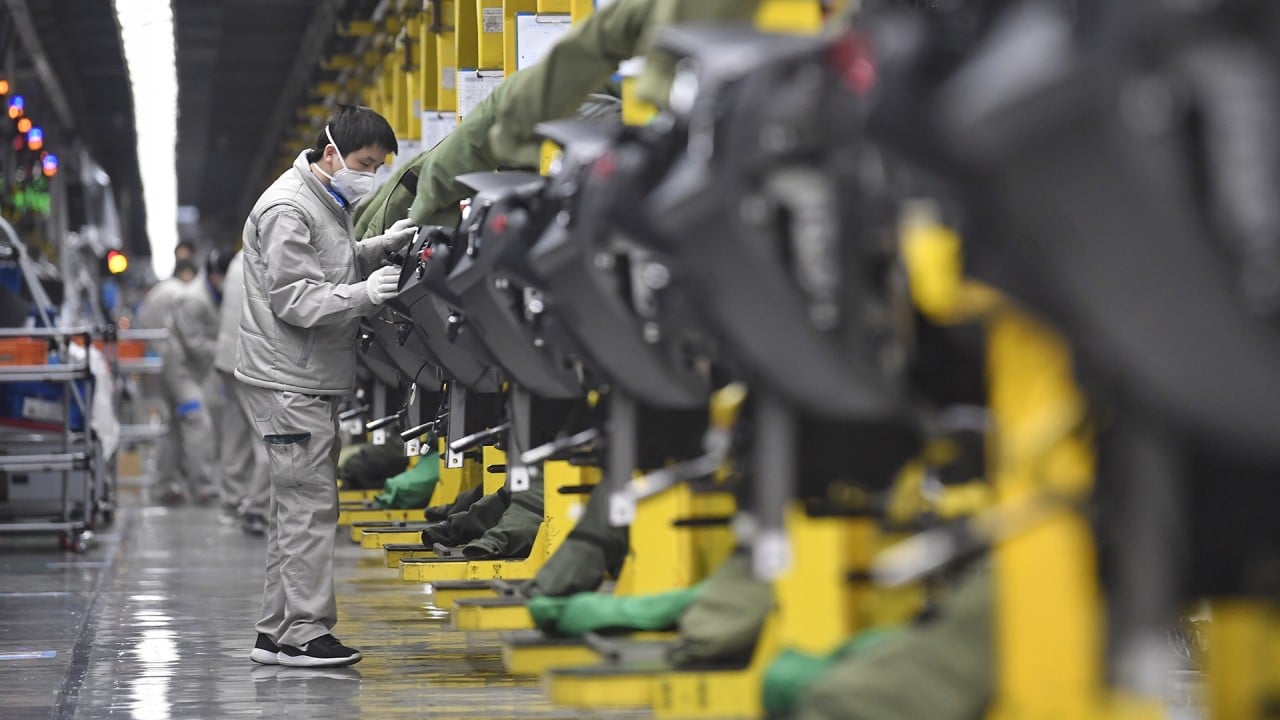
01:33
China’s economy accelerated at end of 2020, but virus-hit annual growth lowest in 45 years

Sales of non-pandemic goods are on the rise as China’s business-to-business (B2B) e-commerce trade boomed alongside traditional trade in the first quarter of the year.
Exports of kitchen products, household appliances and outdoor sporting goods through B2B e-commerce channels during the quarter edged out masks and sanitisers – the dominant trade a year ago – according to one of China’s biggest B2B e-commerce marketplaces, DHgate.
The volume of trade in household appliances and kitchen products on DHgate’s platform surged fivefold compared with the same period last year, while trade in women’s apparel quadrupled and trade in wearable devices tripled. The comparison base was low, however, as sportswear and apparel trade was depressed a year ago amid global lockdowns.
The biggest importers of goods on its platform in the first quarter were the United States, Britain, France, Canada and Italy.
While parts of Europe are still buying more stay-at-home products such as laptops, many countries have started returning to “normal life” compared with six months ago, favouring outdoor goods such as running clothes, tents and bicycles, DHgate founder Diane Wang said.
Chinese exports and imports on B2B e-commerce platforms during the first three months of the year rose 46.5 per cent compared with last year, to 419.5 billion yuan (US$64 billion), according to international trade data released by Chinese customs on Tuesday. B2B exports, in particular, rose 69.3 per cent – helped by a low comparison base – and imports rose 15.1 per cent.
In total, the value of China’s exports grew by 30.6 per cent last month from a year earlier to US$241.13 billion, while the value of its imports grew by 38.1 per cent in March from a year earlier to US$227.34 billion.
Despite ongoing trade tensions and the global economic softening caused by the pandemic, China’s B2B trade continues to defy these barriers.
“Cross-border e-commerce is playing a more and more important role in promoting international trade,” Wang said. “Given the current rate of increase, I believe the sales volume in cross-border e-commerce can account for more than 30 per cent of China’s foreign trade in 10 years.”
B2B e-commerce is cross-border trade that takes out the middleman or agent and is particularly popular for small to medium-sized businesses that see it as a way around barriers to entry.
International logistics group DHL Express also said in a new report on Tuesday that the momentum in e-commerce trade increased during the pandemic and was expected to accelerate in the coming years.
“While the B2B world was already moving online, Covid-19 accelerated the process, meaning B2B transactions are becoming more data-driven and less dependent on traditional one-to-one sales activity,” said DHL Express’ report, called The Ultimate B2B E-commerce Guide: Tradition is out. Digital is in. “The pandemic has accelerated this development like never before, with a sharp rise in businesses selling their goods in the global marketplace.”
Trustana, a Singapore-based B2B platform of verifiable food traders, said businesses were forced to go online during the pandemic to maintain and grow their business. The group signed a memorandum of understanding on Friday with five leading food suppliers from China’s Chongqing municipality.
Instead of looking for new partnerships at trade fairs – restricted during the pandemic – businesses sought them online, said Rebecca Xing, Trustana’s general manager and head of product.
“I think if you look at B2B globally, it is a market in the trillions, not billions. It is what my colleague describes as ‘the dark matter’; it’s everywhere,” she said.
Chinese consumer insight research group iResearch said B2B – which dominates about 70 per cent of China’s e-commerce cross-border industry, with the rest being business-to-consumer trade – is expected to grow more than 25 per cent a year until 2025.